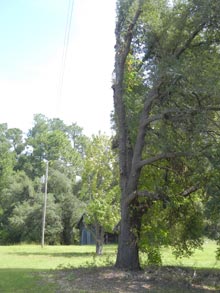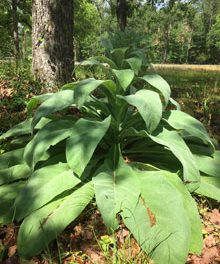 It all began when I started seeing them along the roadsides, great noisy machines and giant trucks, their handlers high above in buckets or down below feeding limbs into the growling maw of a huge grinding machine.
It all began when I started seeing them along the roadsides, great noisy machines and giant trucks, their handlers high above in buckets or down below feeding limbs into the growling maw of a huge grinding machine.
Each week, the crews would be closer – now five miles down the road; now a couple miles away; and just the other day, the machines, their crews and their noise, and the hideous half-shaven trees they leave behind them were within hearing distance of the farmhouse. As they came closer, my dread became more emphatic as I anticipated their brutal attentions on the dozens of trees along our road frontage and along the power line which runs from the road to the house.
These were the tree-trimming crew contracted by the power company (not the power company you’re thinking of – we are supplied by one of the remnants of the original Rural Electric Cooperatives); as with all the linemen and other workers trying to keep power constantly available, their job is a thankless one – never-ending and frequently very dangerous. The trimming crew are not certified arborists, it is clear, and they have more miles of power lines to keep clear than there are trimmers and equipment to keep them clear.
Knowing all that, I am still perpetually irked at the apparent disregard for the trees these crews seem to have in executing their assigned task. It would appear their only concern is the power line, which I can understand, but I have real trouble accepting it.
I decided to think about the upcoming tree slaughter differently this year. Several days before they would arrive at our location, I made a point of stopping and introducing myself to the crew during a break in their labors. By the time they got to our trees, I thought, maybe they would do their work a little more carefully.
Sawing off odd lengths, half the limbs of a huge live oak in a neighbor’s yard fell to the crew’s bizarre vision of what a tree should look like. They assured no overhanging limbs would fall on the power line going to that neighbor’s property, but they left a grotesque demi-skeleton of a tree, full and green on one side, bare and stub-branched on the other.
The next morning I heard a knock on our door and found the crew foreman there, hat in hand, asking if he could talk with me about trimming our trees before beginning. I happily agreed, and I asked him to walk with me over the areas where the power line goes. I assured him I did not expect the artistry of an arborist, but I would appreciate both attention and care in how they approached each tree, especially the ones along the power line to the house. As we talked, I was pleased he seemed receptive and understanding, although clearly he was no fine tree-trimming craftsman.
Denny, the crew chief – he had grown up in a nearby community, and I knew a couple of people he knew – said he was glad that he wasn’t being threatened with lawsuits or being told to stay off my property, a reaction they had just gotten from a property owner just up the road. I was just glad he was willing to listen to me, even if the crew ultimately ignored my requests. Both of us, relieved.
I showed him each tree that I was concerned about. There was a large white oak whose limbs had extended over the power lines; a large old dogwood was growing up into the lines. In the back garden area, several trees had unfortunately grown up into the power lines, threatening a serious power outage. These trees had been planted by my father years ago – foolishly – directly beneath the lines, and this had been the inevitable result. Denny asked how far back I wanted those trees cut.
They would just regrow and present the same problem a year from now. Better to completely remove them now and replant with smaller shrubs and trees which won’t grow into the power lines above. I wondered if they would consider cutting the trees all the way to the ground.
It would present several problems, this complete take down of three trees. The area is largely my container garden, dozens of different plants of all sizes in pots, sheltered by those very trees I would ask to have removed. And what of the falling branches and big heavy trunks? How could I possibly remove all these pots and plants out of the way before the crew began their work? Maybe I was better off just trimming the trees back at the top.
Denny assured me they would be happy to cut the trees to the ground. They would even remove the hundreds of pots and plants to a safe area. And, of course, they would grind up all of the leaves, branches, and trunks and rake the area afterward.
They did all that. The crew spent three days carefully trimming all the trees on the property, removing those large trees in the garden, carefully transferring those pots and plants, and cleaning up everything. The white oak, the dogwood – all the trees in the way of the power line were trimmed carefully and sensitively. At the end, they also brought me two truckloads of ground up hardwood chips for mulch.
To be sure, the tree work was nothing like the precise and artful work I had done by an arborist after an ice storm several years ago. Nonetheless, our trees are safer, our power lines are secure, and none of the trees were ruined in the process.
Our good fortune is due, I am convinced, to our accepting the necessity of the work the power company’s crew are doing. I compare the work done here to the work done on the property along the road, and I am more than pleased with the work they did for me. We welcomed the crew, and they were more open to perform their work in accordance with our preferences, even when it meant a great deal more inconvenience and labor for them.
I’m not sure the same approach would work in a more urban environment. A gardener must do whatever it takes to keep things growing properly, and I find I end up accepting a great deal of compromise just to keep things going. This time, the compromise left me and my garden happy.







